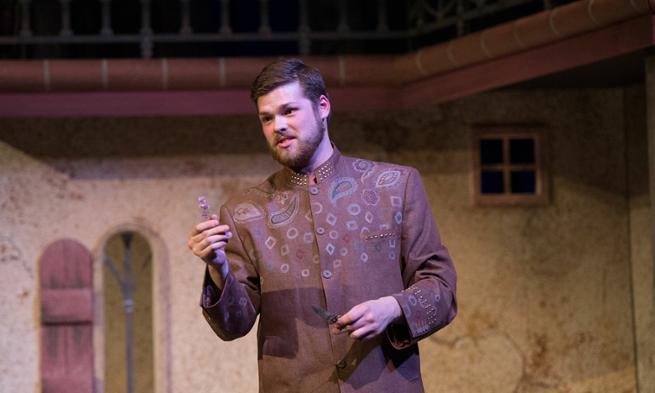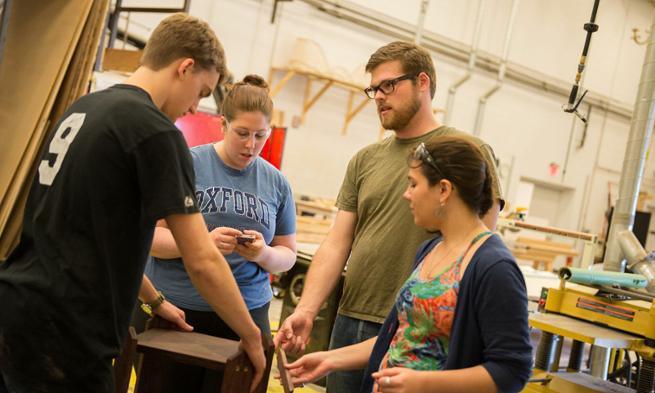Becoming a 'citizen leader'
Arts and Culture
George Dippold ('13), theater major, Richmond, Va.
By Janet Smith ('81)
"'All the world's a stage, and all the men and women merely players' applies to the universality of theatrical experiences as much as it applies to the universality of human experiences," says theater major George Dippold. The May 2013 graduate from Richmond, Va., also says his immersion in the world of theater—as it is taught at JMU—prepared him for the role of citizen more than just teaching him the skills to work as an actor.
An experience in 'plurality'
"Part of the theater and dance program's mission is preparing students for the demanding, dangerous and exhilarating theater industry within a liberal arts setting. In theory it makes sense, and in practice it is an extremely effective academic environment to work in," Dippold adds. "Part of what makes the merging of the economic and creative sides of theater so engaging and worthwhile is the surprising plurality of jobs involved in making theater."
'What makes the merging of the economic and creative sides of theater so engaging and worthwhile is the surprising plurality of jobs involved in making theater.'
In his four years at JMU, Dippold was an actor, director, assistant director, experimental theater deviser/collaborator, technical director, scene shop assistant, publicity manager, co-publicity manager, graphic designer, costume shop stitcher, electrics shop hand, stagehand, house manager, make-up artist, co-playwright and producer/stage manager.
Training collaborative professionals
JMU's Studio Theatre offers complementing courses that train artists in many areas ranging from sound design to movement for the actor. These course experiences draw the very best from students engaging in intense practical training. With the guidance of a faculty adviser, students produce an entire season of shows and gain experience in all areas of producing a play. Add the major's liberal arts-influenced practicum system of at least 35 hours of work in at least four of the available areas—scenery, lighting, costumes, management or performance—and it is clear that JMU theater students are rigorously prepared to be collaborative and well-rounded in their professional endeavors.

Dippold recalls one of his junior-year experiences in Studio Theatre as a "gut-wrenchingly terrifying" learning experience. Two weeks before opening night, he was forced to step up from acting coach and assistant to the director into the role of director of a show lagging far behind schedule. Looking back on the experience, Dippold says he made mistakes in guiding the process and caused a sense of betrayal among the team. But he made discoveries through the painful experience. "I've learned that so much of theater and humanity boils down to trust, patience and honesty, no matter what the situation," Dippold says.
'The liberal arts program fits perfectly within the world of theater, especially in light of getting one's hands dirty intertwining audiences, themes and roles on the stages of theaters and of those in our everyday lives.'
From the stage to everyday life
"In the end, the liberal arts program fits perfectly within the world of theater, especially in light of getting one's hands dirty intertwining audiences, themes and roles on the stages of theaters and of those in our everyday lives. Beyond that, however, it plants the seeds for the act of becoming a more fully aware, well-rounded human being as an artist who is in awe of his or her surroundings and lives to share with the world."
Dippold is currently in South Carolina working at Charleston Stage as a member of the resident acting company. He is acting, teaching workshops in local schools and helping in a variety of technical jobs to help prepare for the upcoming season—just what his JMU citizenship experience prepared him to do.
